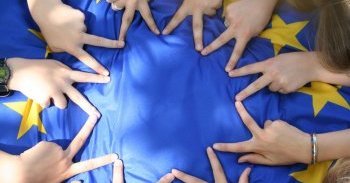The notion of project at the heart of European identity
The notion of project is at the heart of European identity. The word comes from the Latin and most of European languages use it. Etymologically, it means to throw forward; in philosophy it also means to get out of oneself.
Historically, Europeans have spent their time throwing themselves forward. Europe went to discover the world (and then colonised it). It managed to do so because of great innovation allowing Columbus to cross the Atlantic. China was as developed as Europe, but it did not throw itself forward. Why? Partly, at least, because Europeans were moved by a sort of curiosity, by an ambition to get out of themselves. And what a great throw was it, to board on a ship for months hoping to land on the other side of the Earth. Europe has projected itself spatially around the world from the 15th century on. This is only one example, but we can also think of translation as a way of throwing oneself out of its own culture and language, and Europe is the space were we are translating the most.
After the slaughter of the two World Wars and decolonisation, Europeans stopped to throw themselves spatially, but they have continued to throw themselves temporally, that is to project themselves in the future, launching the European integration.
Ways of political identification
When speaking about European political identity - that is to say identity related to a political community - scholars highlight two categories : nation-like identities and post-national identities. The first one, the most populist, conceives political identities as based on a shared heritage, cultural and ethnic content. It draws barriers between Europe and the other, the other being a threat. It responds to the concern of those who are, if not losers in European integration, not perceiving the advantages, for instance by taking the Eurostar once a week.
Another category is a cosmopolitan conception of identity. It focuses on political citizenship that are the rights and values shared within the community. It is a thin conception of identity where there is little room for emotional feeling of belonging to the group. It addresses mostly elite concerns.
To overcome this lack of feeling, Jürgen Habermas developed the idea of constitutional patriotism. To him, a feeling of European identity is necessary to continue European integration, and it is possible. The substance of this constitutional patriotism is a set of right and values that we, European, share and enjoy. To him, Europeans will feel a sense of belonging, patriotism towards those political rights. The problem is that you don’t feed a family with value. In the EU as it goes, with an increasing unemployment rate, a fear of the development of the economic crisis, values are not enough to individual to identify – and thus feel a sense of solidarity, let’s say towards Greeks or Spanish.
How could we strengthen European identity in order to develop a sense of belonging not only for the elite but also for the masses?
A political project to strengthen European political identity
We should go back to this notion of project. In those times of crisis more than in any other, we need to project ourselves far from the storm. Europeans need to know what is the project of the EU to adhere or not to it, and thus to identify to it. And we also need to choose upon our common destiny.
The European project should be re-launched. Since the Convention on the Future of Europe (2000), and mostly after the 2005 referenda, it seems that the EU does not know where it is heading to, that European leaders do not have a vision of where they want to bring us. So, European citizens cannot agree or not on the basis of a project since there is no project. How could they feel that they are part of a common, broad move of a continent toward the realisation of a project? I remember when I was a child and when we were about to change our currency. I remember my grandmother’s fear, but I also remember how excited I was to be part of this great event. After that night, I would be among other millions of people, changing from Franc to Euro. I was 12, I did not know anything about the EU, but I felt that we were all throwing ourselves forward a new experiment. This was possible because some European leaders projected themselves and ourselves toward a common destiny. It was not about abstract rights or values, but it was a concrete realisation
And now? We are not only lacking European project, we are also lacking European leaders to carry out this project.
Two MEPs are trying to restore a project. Verhofstadt and Cohn-Bendit offer a concrete project for the future of the EU defining what it should do and how it should do it. They would like this dynamic to lead to a pan-European referendum that would allow European citizens to choose upon this project. This referendum would be a constitutional momentum in which we, Europeans, would identify as Europeans being part of the same project. It can appear unrealistic, but did Columbus seem realistic when heading to India?


Follow the comments: |
|
